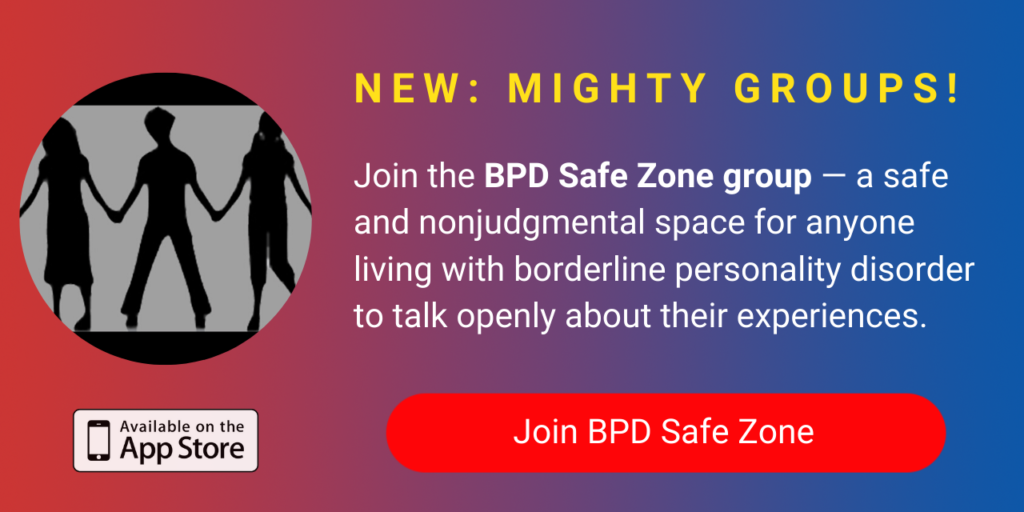The Most Helpful Way to Support Someone With Borderline Personality Disorder
Editor's Note
Please see a doctor before starting or stopping a medication.
If you experience suicidal thoughts, the following post could be potentially triggering. You can contact the Crisis Text Line by texting “START” to 741741.
If you take nothing else from this article, please take this. In my opinion, the most helpful thing someone can do for a person with borderline personality disorder (BPD) is show them validation. Being validated (that is, being made to feel that emotions and feelings being experienced are valid) is the single most important show of support because it helps reassure people who often experience extremely strong emotional reactions to things that they are not “overreacting” or just being “dramatic.”
Of course, it may be the case that a neurotypical person wouldn’t necessarily feel quite so intensely upset, angry or even happy in the same circumstances, but supporting someone with BPD by showing them that there are reasons why they feel the way they do, and understanding why, is extremely helpful. Personally, feeling like no one understands me and that I am alone in my feelings is one of the hardest parts of living with BPD. Every time someone invalidates my emotions or tells me I shouldn’t be feeling a certain way, it makes me feel more isolated with my condition and triggers negative self-talk, such as, “I am a freak; I am useless for feeling this way; I should be feeling X, not Y.”
Often, people invalidate my feelings without even realizing they are doing so; in fact, they probably think they are actually being supportive. For example, if I expressed a feeling of frustration at myself for not achieving the distance I set out to run one day, someone might try and helpfully reply that I “shouldn’t be frustrated” but rather “proud to complete any distance at all.” However, whilst to a neurotypical person, this might be a way of congratulating them on their efforts, to someone with BPD the focus is most likely going to fall on the “you shouldn’t feel frustrated” aspect of the comment and thus make them feel immediately invalidated and ramp up their feelings of upset even further.
I have deliberately chosen a fairly simplistic example to illustrate the point but invalidation can occur so frequently and in so many situations. To support someone with BPD, thought needs to be given to the fact that that person is likely battling with both extreme feelings and simultaneous beliefs that those feelings are somehow wrong. Therefore, care needs to be taken not to inadvertently reinforce those beliefs when trying to help them feel better.
Another area that needs to be understood in order to offer useful support to those with BPD is that emotions really are often felt in their extremes, even in what would be low-key situations to a neurotypical person.
I often talk of rarely feeling irritated but often full of rage, not sad but despairing and not merely invalidated but outright abandoned. The fact is, for those with BPD, emotions can intensify from 0 to 100% extremely quickly and we are sensitive to anything that might give us cause to increase that intensity. For example, if I am meeting someone at an agreed time and they are 15 minutes late, I might initially feel angry (compared to a typical response of frustrated) but then if they explained that the reason they were late was that they had to take a phone call from someone else on the way, my own insecurities and sensitivities that I am not as important as others would push that anger into rage.
Obviously, there is some degree of responsibility on the person with BPD to try and temper their extreme emotions to fit into societal norms (I couldn’t go around acting on my rage every time it occurred for example) but it would be supportive if more people understood how extreme the emotions we often feel are, not least because simply experiencing everything at 100% intensity is exhausting and those with BPD often find lots of social interaction difficult as a result.
The third thing I would ask of someone who wanted to support me with my BPD would be simply to listen. There is often a feeling that we somehow need to help people with mental ill-health feel better by doing something to change their situation. This is illustrated well by the YouTube video, “It’s not about the nail.”
In a recent personal example, I spoke to someone on a support helpline and told them how upset and despairing I was feeling. Rather than listening to what was going on for me and how I felt, the person at the other end of the line instead declared that they were going to talk to me about other things to cheer me up. Not only did that invalidate how I was feeling (I clearly should be happy, according to them) but it also missed the point that I just needed to be listened to. I wasn’t asking for practical help to feel better, I needed a listening ear to hear how hard things were. Sometimes, in fact, I would go as far as to say often, this is all that is needed.
Since emotional distress is so common for us, my advice for those wanting to better support people with BPD would be to assume listening is what is needed unless we mention practical support ourselves. Jumping in with suggestions about how things could be better “if…” just leads to more invalidation.
Another aspect of support I want to mention surrounds medication. Some people with BPD will take medication for the condition (antidepressants, antipsychotics and anti-anxiety medication are often taken to help stabilize mood, for example) but others won’t. This may be a personal or professional choice but the important thing is that it is a choice for the person with BPD and their mental health professionals, and not for anyone else to make.
Everyone has their own opinions on medication, particularly it seems when it comes to mental health conditions, but if you are looking to support someone it is important that you understand their point of view on the matter and support the decisions they make.
Hearing others constantly doubting the efficacy of medication, for example, may lead someone to think they are doing the wrong thing and take themselves off their prescription unsupervised. This is dangerous and could lead to far more harm than good. Of course, if the person with the condition wanted to explore other options, it is fine to support them in doing this safely with advice from professionals but forcing your own views on medication (whether they be anti- or pro-) onto anyone else is not helpful.
Finally, suicidal thoughts are something that people with BPD often struggle with and which neurotypical people, understandably, often shy away from talking about. However, supporting someone with BPD effectively will probably involve supporting them during crises and hence at times when they are feeling suicidal.
People often worry that if they mention suicide to someone with mental illness, it may put the idea in their head when it wasn’t there before. This is very unlikely to be the case, particularly with those who have BPD. Statistics show that as many as 75% of those with this condition will attempt to take their own life at some point so chances are, they will be having the thoughts themselves anyway. With a statistic this high, though, it is imperative that those looking to support people with BPD are willing to have difficult conversations with them. Supporting someone through a suicidal crisis will hopefully make them feel more held and understood and less desperate. Personally, having someone to share my suicidal thoughts with at times when I’ve had them has reduced their intensity purely because I feel better understood and yes, more validated.
Of course, it can seem scary talking about why someone wants to take their own life, but having that conversation and putting yourself in their shoes to establish why it is they feel so despairing, can offer a great deal of hope to the person feeling that way. It brings together what has already been mentioned; validation, understanding that emotions can be extreme and the need for the simple act of listening.
Supporting someone with BPD can undoubtedly be a challenge, I am the first to admit that, and there are more aspects to the condition that I simply did not have space to mention here. However, if you are looking to support someone with the condition, I hope the five areas discussed above goes some way in helping you do so.
Please remember, BPD is a condition we live with and it doesn’t define us — above all, treating us as people and not labels could be the most supportive thing of all.
Photo by Roxxie Blackham on Unsplash


